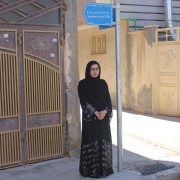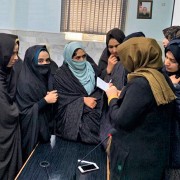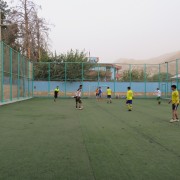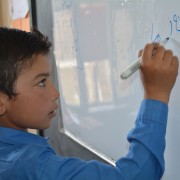Speeches Shim

Najia Safdari, a 32-year old mother of two and a small business owner, is the only breadwinner in her family. Her husband died two years ago from stroke. At her factory, Najia processes raw wool and weaves carpets. The lack of a proper addressing system in Herat made it more difficult for Najia to connect with her clients and suppliers, especially in the case of new connections.

In Afghanistan, the judicial entrance exam is the gateway for new judges. However, the exam only took place in Kabul, which meant that students from across Afghanistan were required to travel to Kabul and register for the judicial exam with the Supreme Court. This travel requirement made it even more difficult for female law-trained graduates. According to the Supreme Court Human and Institutional Capacity Development Assessment Report released in December 2016, there were 82 female judges at the Central Supreme Court out of a total of 108 judges. However, there were 62 female judges in Kabul province, out of a total of 249 judges. There were no female judges in Badakhshan, Kapisa, Laghman, Maidan Wardak, Nangarhar, Parwan and Sar-e-Pol provinces.

Since October 2017, USAID has been working with the Afghan Ministry of Irrigation, Agriculture and Livestock (MAIL), to place young men and women as interns in the MAIL provincial headquarters in eight Eastern provinces. Over the course of three months, the interns attend agribusiness events, training and farmer field days, and work in various MAIL departments to gain basic administrative and agricultural extension skills.

Puli Khumri, the capital of Baghlan, does not received much attention and support in terms of public services, especially play-grounds and other sports facilities. Realizing the importance of exercise for children and youth, USAID assisted the municipality in construction of a new futsal pitch. The management and maintenance of the futsal court has been leased to a private entity under a Public Private Partnership that generates around AFN 280,000 annually in municipal revenue.

The Afghan Children Read project used an evidence-based approach to help improve reading and writing comprehension in grades 1 – 3. The project pilot covers four provinces, Kabul, Herat, Nangarhar, and Laghman, where an estimated one-half million students in both public and community-based schools have been exposed to this early grade reading model. Monitoring and assessment conducted by the project team found that access to supplementary materials and teacher guides plays an important role in the success of early grade students.


Comment
Make a general inquiry or suggest an improvement.